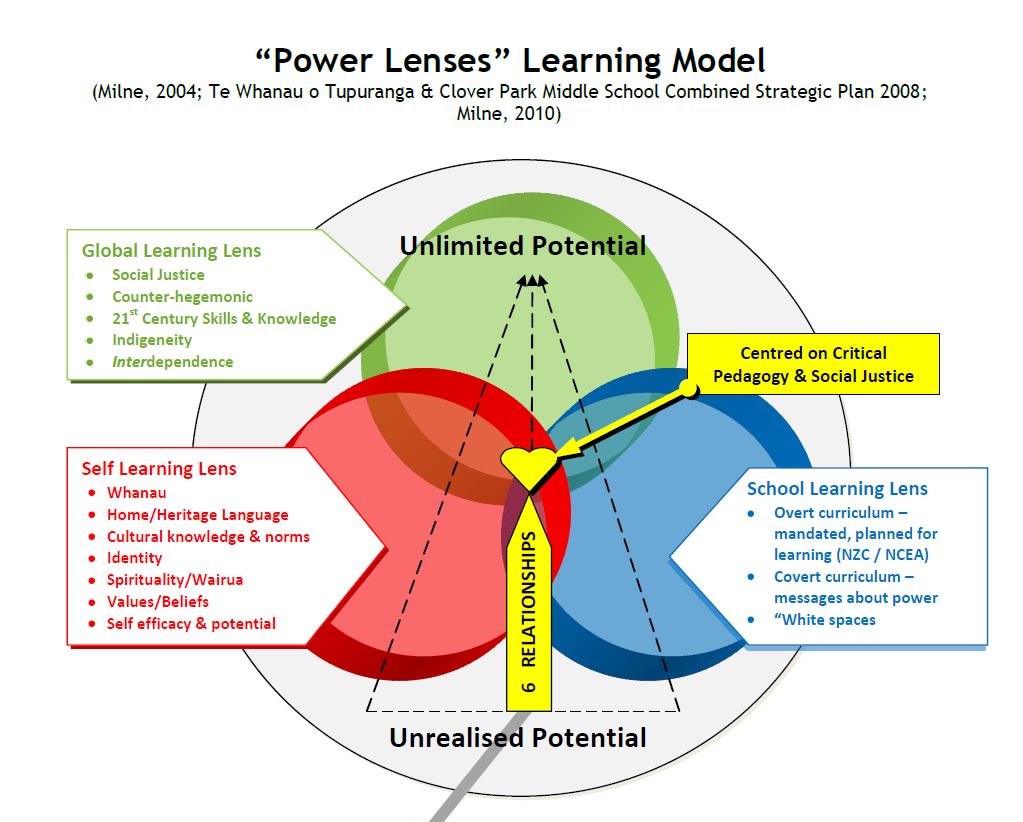Power Lenses Learning Model
Our “Power Lenses” describes an approach that is about empowering students and families and about looking at learning a different way.
In this model another whole body of legitimate knowledge sits alongside what is mandated in the national curriculum or ‘School Learning.’ We need to value this ‘Self Learning’ just as highly as we value academic learning. Our children’s languages, their cultural norms, how they “live as Māori,” how they can learn and succeed ‘as Māori,’ or as Samoan, as Tongan, or whoever they are, how they develop a strong cultural identity, their wairua/spirituality, whānaungatanga/their connectedness – are all high status learning, valid in their own right. Our third learning area is our ‘Global Learning’ lens – which connects our young people to the many worlds and cultures outside school, and particularly to learning needed for the future through information and communications technology.
In this approach we acknowledge specifically the significant learning that our students bring from home and from their different cultural backgrounds and experiences. The approach challenges the mindset that western academic knowledge is the only legitimate knowledge our students need to go forward into the world beyond school. It validates students’ home or heritage knowledge and teaches our students to be critical thinkers about social justice. Thinking this way about learning influences all initiatives and structures within the school, including:
INTEGRATED CURRICULUM - Issues of social concern determine the topics for study. These inquiries are directly linked to students’ lives and experiences and are culturally relevant.
WHĀNAU - All decisions within the school about how classes and learning are organised are driven by the concept of whānau. Classes are of mixed ability and students of all ages work together. Students stay with the same teachers as far as is possible and develop strong relationships with them, with their learning, with each other and between home and school.
CAMPUS LEARNING MODEL: UNREALISED TO UNLIMITED POTENTIAL - In 2006 we developed a model that uses our “power lenses” to describe our students’ progress through the school. Adapting an approach suggested by Professor Mason Durie we are describing students usually described as ‘special needs’ or ‘at risk’ as students with unlimited potential. We believe all our children are on a continuum from a position of unrealised through to unlimited potential and our job is to identify their position on that journey and to make sure they are supported and challenged to move forward.
Our Learning Model outlines our belief that:
Learning is integrated – across subject areas and with students’ lives and realities
Learning is negotiated – by students, with teachers
Learning is inquiry-based and student-driven
Learning is critical – it provides young people with the power and the tools to understand and challenge inequity and injustice and to make change in their lives
Learning is whānau-based – it is collective, cooperative, collaborative and reciprocal i.e. learning is shared – you receive it, you share it, you give back to other learners
Learning is based in strong relationships – with self, with each other, with teachers, with the learning itself and its relevance, with the world beyond school and between home and school.
Learning is culturally located and allows you to live your cultural norms throughout the school day
All students are at different places on this continuum and this position is identified
Our aim is to move our young people from a position of unrealised potential, to one where their potential, as active, empowered, contributing members of society, secure in their own cultural identity, and with a wide variety of options for their future, is unlimited.

